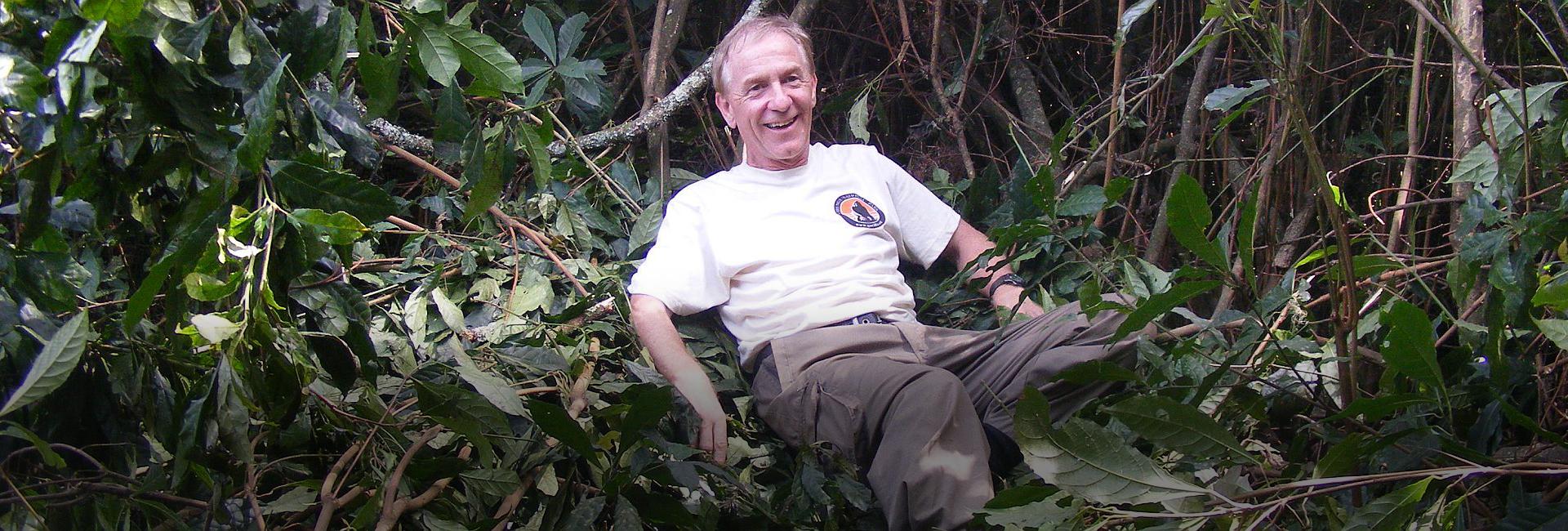Recently, we chatted with previous volunteer Frank Lomas, who after joining The Great Gorilla Project twice, and after falling in love with the country and culture, helped to set up a new school in Uganda for impoverished children.
What drew you to The Great Gorilla Project?
“I’ve always loved gorillas. I think ever after seeing Gorillas In The Mist, I had always dreamed of seeing them in the wild. I first found The Great Gorilla Project in 2013 and felt particularly lucky to have Ian Redmond who had worked with Dian Fossey leading a guided tour at the time. The tour was amazing. We even found the gorillas nest from the night before, and I managed to get in the Silverbacks nest! I then went back for a second time in November 2017.”

Are there any moments that really stick with you from the project?
“I loved everything about it. The gorilla treks, visiting schools, Queen Elizabeth National Park, baby orphanage, Batwa ex-poacher village, Cycle cinema, staying at Golden Monkey in Kisoro, all were experiences that I couldn’t get enough of.
Though there are happy and sad moments with The Great Gorilla Project as it’s not just about the gorillas but the community and helping them. A sad moment that really stuck with me was the first time we visited the children medical centre. There was a tiny baby in an incubator who was very poorly. He caught my attention because his name was Frank too, a fairly uncommon name in Uganda. When I joined the project again in 2017 and asked a nurse where Frank was, now as a 4-year-old boy, she went to check and returned with news that Frank had sadly passed away as a baby. That moment has always stuck with me.
Happier moments that I’ll always remember are working with the Kisoro Demonstration School. The majority of the children are deaf or blind, it’s amazing being able to help the kids and see how they navigate life, and the cycle cinema is really good fun.”

What is The Bwindi Foundation and how did it begin?
“The Bwindi Foundation is a new school and future orphanage in Uganda for in-need children struggling with poverty, disability and family disruption.
In 2017, I met John (the director) through one of the porters on a Gorilla trek, and he told me about the dream of building a school, and that’s where the idea of the Bwindi Trust Orphanage Foundation formed. I wanted to help and started fundraising when I got back, I managed to do various things, like running the Manchester 10k run and other fundraising projects, and we managed to build a school.”

How long has The Bwindi Project been in action?
“Well, 2017 is when I met John, and we talked about it. The actual fundraising started later that year. The building work started in 2018, and then the school opened in March 2019. Unfortunately, the pandemic meant that the school had to close for a while, but we’re hoping to be back open in January.”

What are the aims of The Bwindi Foundation?
“The people of Nteko village are poor, they have no money, never mind the thought of sending their kids to school, and that goes for most of the people in the countryside, so we have built a free school for the children to attend. We offer board to orphaned and abandoned children as well and have built a kitchen where the children can have two meals a day even on the weekends, and we have built a great playground for the kids too.”

How can people get involved and help the children of Nteko?
“The Bwindi Project is entirely funded from donations. The website is bwindiproject.org, and there is a sponsorship page showing the children that we are trying to get sponsorship for. When you sponsor a child, a portion of that goes straight away to the family so they can buy food and feed all the mouths of the family, not just the children. The sponsorship pays for the child's education, clothes and footwear, school supplies, and goes towards medical care if needed.

People can also donate to other projects we are working on. We are just in the process of building a second school block as there isn’t room in the first block. There's also a number of fundraisers for future additions and supplies for the school, as well as a virtual shop from which people can buy. Rather than sending clothes, shoes, etc as this costs a lot of money in postage, people can pay for things available in Uganda that John will go out and buy for the child."

And what would you say to future volunteers of The Great Gorilla Project?
“It is no lie that if you want adventure, to experience and share the everyday life of the people, to witness incredible wildlife contacts, and at the same time, know that your trip is actually supporting conservation and bettering the lives of the communities, then this trip is my number one recommendation. I went on two amazing holidays, and it influenced me to build a school in Uganda! You see, The Great Projects don’t just supply holidays, they supply dreams too!”














